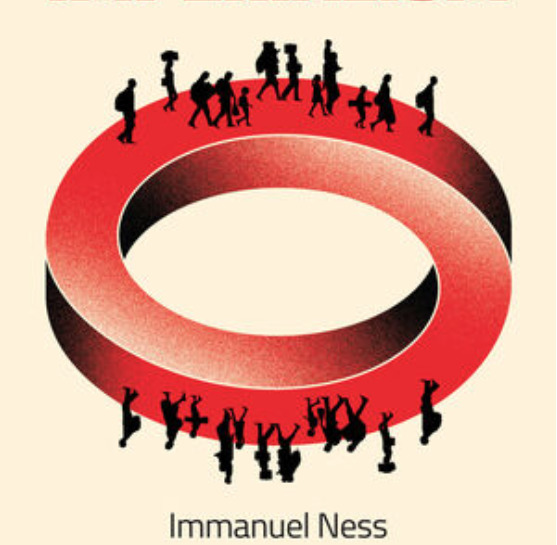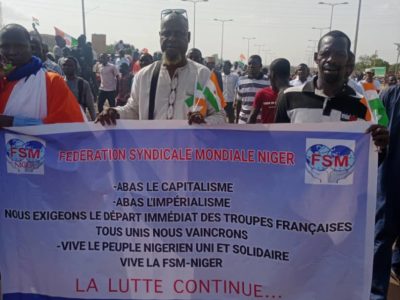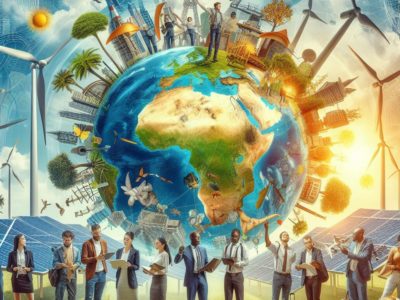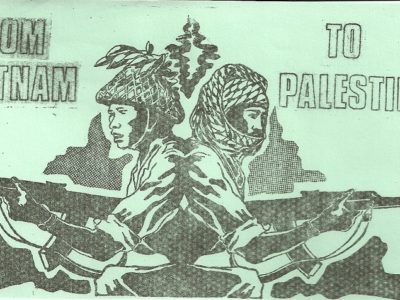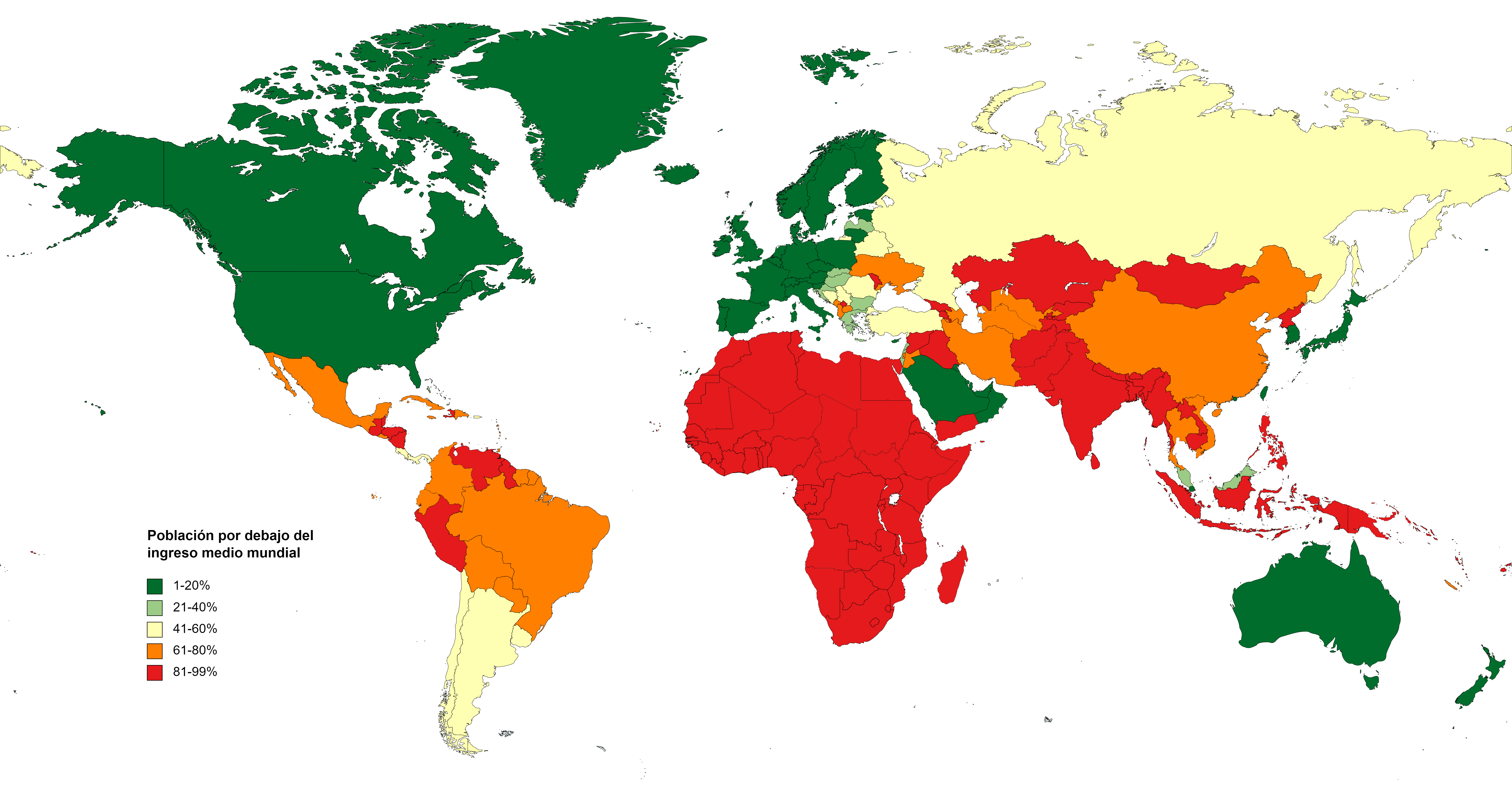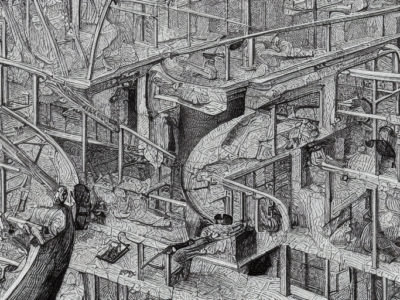Immanuel Ness brought us new research on migration and what it means for global capitalism. “Migration as Economic Imperialism: How International Labour Mobility Undermines Economic Development in Poor Countries” published by Polity, explores migration using the framework of Arghiri Emmanuel’s theory of unequal exchange.
Prof. Ness was kind enough to give us an interview and provide us with details and conclusions of his research. We consider this work to be important for activists to understand how migrant labour fits into the strategy and tactics of the anti-imperialist struggle.
In your latest work you set the context of immigration within Emmanuel’s concept of unequal exchange that necessarily places migrant labour as a world-wide phenomenon and not exclusively local “problem” as it is presented in the media. That implies that immigration being a structural feature of global capitalism. Can you explain in what way it is structural and what is the structural necessity for it? Can capitalism survive without migration?
Global migration is integral to understanding unequal exchange today and the pernicious consequences of neoliberal capitalism and economic imperialism perpetrated by Western capitalism today. Unequal exchange exposes the growing dynamic of migrant labour, and its use as the primary current among bourgeois development economists to lift the Third World out of poverty. Neoliberal western capitalists have designated migrant labour as the instrument for transforming poor countries into prosperous economies. Migrant labour has emerged as the most recent fad of free market capitalists as the free-market prototype advanced by Milton Friedman and his acolytes whereby unbound individuals take responsibility for their personal welfare. In the Marxian sense, workers are removed from the domination of the feudal economy through capitalism and then forced into labour in the market without constraints on the extraction of surplus labour and exploitation of workers for profit.
The intensification of international labour migration commenced with the emergence of neoliberal capitalism in the mid-1970s and its expansion worldwide by the beginning of the first decade of the 21st century. Neoliberal capitalism drove workers and peasants to migrate to urban regions within countries and to international destinations in search of menial work in agriculture, construction, manufacturing, logistics, and care work. The World Bank, International Monetary Fund (IMF), and multilateral development agencies identified the meagre earnings of Global South workers as the most successful model for economic development in their home countries through remittances sent home, supposedly invested in infrastructure, business and social needs. This is where free-market capitalism gains significance: rather than states relying on Official Development Assistance, and the foreign bank loans that impoverish much of the Global South and forces states into structural adjustment programs and shock therapy, international financiers have arrived at the revelation that indebted countries could spur economic development through putting their working class to work in the Global North and strategic international financial centers: Dubai, Hong Kong, Kuala Lumpur, Singapore, Tokyo and other wealthy international hubs in Western Europe and North America.
The World Bank, IMF and other Western development agencies proclaimed temporary migrants unleashed worldwide as integral for the economic development of poor countries. But the record is far from the expected outcome that temporary migration and even undocumented labour would become agents for development by investing their economic remittances in new industries and industrial installations. The reality is that this economic development model is a myth for most of the Third World mired in poverty. In fact, migration contributes to the intensification of poverty as workers are trained at home to work abroad as skilled and semi-skilled workers in science, technology, engineering, and mathematics (STEM), health and domestic care, and even manufacturing. Entire economies are placed out of kilter through warped and pointless forms of development that are in harmony with the demands of the rich countries of the Global North, but not poor countries of the Global South. Thus, Nepali temporary workers are trained to work in plastics and electronics in Malaysia and shipping workers in Britain. Most of the Moldovan population lives abroad to earn enough money to survive, and Salvadoran workers must travel to the USA to provide for their families at home.
In my research over the past decade, I found that migrant workers send remittances back home far less than the Western imperialist development agencies contend, as they do not take into consideration that the number of migrants are actually far higher than official statistics, as many travel without documentation and are not calculated by the United Nations International Organization for Migration and other bodies. In most cases, precarious migrant workers send far smaller amounts of remittances, far less frequently. Migrant workers in destinations in the Global South can barely pay for their basic living expenses. Certainly the global financial recession of 2007-2008 among other economic shocks, and the COVID-19 pandemic from 2020-2022 demonstrate that the flow of remittances is not even a certainty, as many temporary migrants working in low wage industries were forced to return to their home countries without employers paying their wages, a form of blatant and expansive wage theft for Third World workers. To avert default, the IMF compels dependent states of the periphery to succumb to structural adjustment packages, for example, most recently, Ghana and Zambia (See Appendix). Concurrently, peripheral countries that are unable to repay loans to Western banks are at the highest risk of economic default, and, unless they withdraw from the western dominated global imperialist economy, they will be required to assent to fiscal and monetary restructuring packages that further impoverish those at greatest economic risk. Peripheral countries facing IMF structural adjustment have the highest share of their population migrating abroad for low-wage employment, viz. El Salvador, Honduras, Malawi, Pakistan, Nepal, and Sri Lanka (See topic #6 for elaboration).
Rarely, if ever do countries develop major industries as a consequence of migration. As Political Economist Ali Kadri asserts, those migrants that have been working overseas for many years may become petty capitalists in rural regions, drawing workers from the agricultural fields, the mainstay of national sovereignty and human liberation. Agrarian workers are the most likely to engage in rebellion against oppression, as the rural areas have proven essential to building anti-capitalist insurgencies. As such, removing agrarian labour to work abroad, or for local migrants who may have accumulated a nest egg working abroad, restricts the capacity for social movements in the Third World to sustain themselves during anti-imperialist struggles, for example, Palestine, South Africa, China and Indochina (Kadri 2020).
Honest observers can only conclude that migration for economic survival is coercive as most workers cannot survive in their home countries. Thus, migration is among the most ruthless forms of economic imperialism today. Temporary migration reveals how unequal exchange can be used to advance the interests of a few wealthy migrants who are educated and trained workers employed in STEM fields, as only they can stay in destination states for extended periods, gain citizenship, and establish economic networks that develop isolated pockets in the Global South, for example, India’s financial industry in Mumbai, information technology in Bangalore, and accountants in Hyderabad, which only benefits a small fraction of privileged upper class. Highly skilled migrant workers may go on to manage multinationals in India’s urban centers, and even in the US and the West, where they become oppressors themselves. But highly skilled workers from India represent a small fraction of the country’s migrant workers, and, if they return, exploit internal migrant workers in key industries: call centers, construction, manufacturing, and especially domestic workers.
Migration is certainly not a ‘problem’ for the international capitalist class but an integral structural factor to expand imperialist capitalist profits through reinforcing global production chains. Higher levels of surplus labour can be extracted from low-wage migrant labour than First World workers, and, by necessity, this temporary migrant labour is essential for expanding profits for international capitalists. Additionally, migration as economic development propagandists at the World Bank and IMF have deceptively advanced the myth that poor countries will advance economically as economic remittances will be invested in new infrastructure. To the contrary, remittances are the product of economic imperialism, that benefit what Xiang and Lindstrom have coined the ‘migration infrastructure’, representing the economic imperialists who benefit as brokers, agents, employers, origin and destination state bureaucrats, and beyond (2014).
Labour migration does not bequeath Global South countries the capacity to refine and fabricate natural resources from petroleum to platinum, nor do they transform cocoa beans into cocoa and chocolate. Profits are realized through the imbalance in trade between the periphery and the core, as the most profits from cocoa, tropical fruits, and other agricultural commodities, are realized in the North. The imperialists must continue to profit from maintaining unequal exchange through labour migration, representing the most recent development policy promulgated by finance capitalists, seeking to extract human and natural resources and realize profits in the most lucrative markets, leaving the dregs for the Third World. Notably, these crumbs are economic remittances sent back to origin states. Worse still, rural workers who are at risk do not benefit from the extraction of natural resources and producing agricultural goods consumed in the West, but local comprador capitalists and their patrons in imperialist countries do. This dynamic corroborates Ruy Mauro Marini’s dependency thesis expounded in the Dialectics of Development (Marini 2022).
Finally, neoliberal capitalism and economic imperialism in its present form cannot survive without Third World migration. If we examine the demographics of most rich countries, migrant labour, who are mostly temporary migrants, comprise over 10 percent of the population. In Qatar, foreign migrant labour comprises 90 percent of the population, without citizenship rights. They are integral in meeting an array of needs of the capitalist class: from agricultural commodities, housing, and manufactured goods, to domestic and care services. If Arghiri Emmanuel had observed the present global migration regime, he would certainly conclude that it is the most destructive form of unequal exchange, as wages of Global South workers employed in the North are a bare fraction of workers in the North (Emmanuel 1972).
Most workers from the global periphery cannot enter and stay in the Global North permanently but are depicted as temporary or ‘illegal’ in most of Western Europe and North America, and other rich states and economic hubs. They are under relentless threat of arrest, imprisonment, and deportation. Yet paradoxically, temporary and undocumented migrant workers are essential for accruing surplus profits. In their absence, capitalist profitability would be reduced and the working class in the North could not maintain high standard of living, a central feature of the depravity of 21st century economic imperialism.
The title of your book qualifies migration as economic imperialism. Could you briefly explain how you define the concept of imperialism given that there is little consensus on the left about what imperialism is?
Imperialism is a legacy of the lawless and callous expansion of European capitalism into the Third World from 1500 to the present in search of natural resources and accumulation of profit that endures to the present. The history of imperialism is well-known and established, but repeatedly rejected by its beneficiaries, or viewed as a mission civilisatrice to rationalize and absolve five centuries of European genocide and plunder. In the aftermath of formal independence in the 20th century, most historians contend that the exploitation of the Global South had come to an end. However, historians do not account for the persistence and expansion of imperialism through economic domination, supported by Western military dominance and spurious political manipulation to overpower and dominate regions outside of the imperial core in North America and Western Europe. Today’s Imperialists impose military, political, ideological, cultural, and most importantly, economic control over the Global South through demanding that the entire world complies with its neoliberal capitalist dictates which are a pretence for democracy and a free-market capitalism that grants only a few prospects for economic mobility. In the Global South, neoliberal capitalism is a prescription for an even more rapacious form of exploitation than present in the pre-independence period. I invoke the term economic imperialism to expose the exploitation that underlies the deception of national independence that could be the basis for achieving socialism in a poly-polar world with multiple regional centres of power.
If not for Western economic imperialism imposed on the periphery, including extreme debt, economic restrictions, and sanctions, those Third World countries who dare to challenge the prevailing form of capitalism, could succeed in advancing a socialist path. To undermine the economies of states that are moving toward socialism, or defined as actually existing socialism (AES), economic imperialists have imposed economic sanctions on Third World economies that defy their rules-based order. The West has ever more imposed economic sanctions on states that do not conform to neoliberal capitalism.
A case in point is the nationalization of Venezuela’s petroleum industry. Following the election of Hugo Chávez as president of Venezuela in 1998, the governing United Socialist Party of Venezuela (PSUV) initiated a nationalization of the country’s natural resources, notably its extensive petroleum reserves. In response, the US sponsored a failed coup d’état in April 2002 to depose Chávez, which was fiercely opposed by the popular masses, and the restoration of his power less than 48 hours later. To penalize Venezuela for nationalizing natural resources, the US and its Western allies imposed economic sanctions on Venezuela, causing the rentier economy in the process of transformation, to faulter and fall into economic crisis, including a severe rise in inflation, and economic decline. The country’s economy dependent on petroleum sales to the West slowly ground to a halt, but Chávez and his successor Nicolas Maduro, maintained power. Economic sanctions produced economic instability and millions of migrants left the country to regional states and the US in search of gainful employment. Does the World Bank and IMF believe the out-migration from Venezuela is an economic development policy equivalent to other states? Certainly not. The mass migration exposes the unequal exchange between Venezuela and the Global North, and the imbalance in the terms of trade, grinding down the national economy. It is hardly surprising that labour migration from Venezuela has expanded from the 2010s to the present, but why do the Western banks not consider the migration economic development while economic migration from El Salvador, Guatemala, and Honduras is deemed economically beneficial?
The US economic blockade of Cuba since 1962 is yet another example of coercive economic imperialist measures against states that reject capitalism and genuinely strive for socialism. It is remarkable that Cuba has maintained socialism even after the dissolution of the Soviet Union in 1991, and the withdrawal of economic assistance. The rejection of neoliberal capitalism is supported by the Cuban people, who do not wish to diverge from a socialist path, despite sanctions and US destabilization. While many Western Marxists critique Cuba for its faults or defects, the people of the country have prospered under socialism relative to other countries in the region, with high life expectancy, low infant mortality, advanced education and quality health care comparable to the rich countries in the North. Even if some market forms were necessary in the last 30 years, Helen Yaffe has found the Cuban people committed to the revolution (Yaffe 2020). Undeniably, if a majority of Cuban people rejected socialism, out-migration would be higher, but Cuban migration is far lower than most other countries in the Caribbean and Latin America.
Migrants are often facing a number of issues starting with legal problems (such as the case of ‘illegal’ immigration) to various levels of social vulnerabilities including ethnic, religious, racial and gendered discrimination. What role does this discrimination play as part of economic imperialism?
The advanced capitalist countries of Western Europe and North America designate migrants as ‘illegal’ to appease their national working classes who have become enraged that their economic privileges and status are under threat from foreign workers crossing the border. Both regions are in fact beneficiaries of migration, supplying an unceasing source of low-wage labour to fulfill the needs of the national capitalist classes as well as the working classes who benefit from low wage agricultural, construction, manufacturing, and care workers. In the COVID-19 era, migrant workers have served essential jobs that native born workers have shunned. Moreover, undocumented migrant labour has supplied workers to the logistics industry and has been essential in maintaining economic activity, in transportation, delivery, and warehouses. One cannot overstate the significance of undocumented workers to the economy. They provide crucial workers to multinational firms, mid-sized businesses, and the working class of the Global North. Documentation status renders essential migrant workers as relentlessly exposed to the coercive power of the state during recessions and when no longer indispensable to the economy. Employers have the flexibility to hire and dismiss workers at will, who then are subject to state coercion through arrest, imprisonment, and deportation.
Undocumented migrant workers are highly beneficial to politicians and elected officials. Populist politicians can confidently count on migrant labour scapegoats for financial crises and economic recessions, even if they are indispensable to commerce and business. It is not only right-wing populists who appeal to native-born workers through accusing migrants as the cause of all perceived social, political and economic challenges, whether they exist or not. Thus both the right and left refer to migrants as constituting a ‘crisis’, when they are in fact victims of crises in their home countries through imperialist wars to depose governments which dare to defy the USA and its NATO allies. In fact, who are the victims and experiencing crises? Workers fleeing imperialist wars in Iraq, Libya, Syria, and other states in Southwest Asia and North Africa?
Yes, it is correct that populations in destination states of the global North discriminate against migrants on the basis of ethnicity, religion, and race. However, in view of the fact that migrant workers are not deemed equal to the native-born in the advanced capitalist countries, while migration may improve their conditions compared to those who remain in the South, they are viewed as ‘subaltern’ populations. In Western Europe migrants from Southwest Asia and North Africa are prevented from legally entering the Schengen Zone, while Europeans can move freely and establish residence throughout countries in the region. Observers have shown that restrictions on migration embody a form of global apartheid, a perspective that is in accord with Emmanuel’s position that was advanced more than 50 years ago. Migrant workers outside of Europe, or on Western Europe’s periphery are subject to xenophobia as populist politicians and the media stir up false claims that they are a threat to national sovereignty.
Emmanuel claimed that internally–within borders of a single core state–the wage levels are not so different (at least, they are within the same order of magnitude unlike the salary differentials between core and periphery). According to your research, does immigration change this situation given that working informally, without a contract, subjects them to higher levels of exploitation and lower nominal salaries relative to formal workers?
The labour-capital accords in the Global North in the post-war era through the formation of social welfare states and labour-management collective bargaining ensured wage gains for workers in countries in the imperialist core, expanding their significance as sources of profit to the political economies of rich countries and their capitalist classes, which were dependent on a privileged working class, or ‘aristocracy of labour’ wealthy enough to purchase commodities produced by Third World workers. Multinational corporate profitability is realized and ensured by means of the extraction of commodities through the super-exploitation of labour and extraction of agricultural and natural resources in the Global South.
Moreover, in view of the probability that rich countries have an excess of low-cost commodities in relation to relative wages, Emmanuel argued that migration on equal terms to the imperialist regions of Western Europe and North America would produce greater international equality (Emmanuel 1972). In the post-colonial era from the mid-20th century to the present, first-world capitalism is highly dependent on the exploitation and extraction of value from poor countries under the thumb of rapacious Western imperialism.
We must distinguish migration and immigration, an essential point of Migration as Economic Imperialism (Ness 2023). Most migrant labour today are low-wage temporary migrant workers or undocumented migrant workers who have little hope to stay permanently, even if they are integral to the economies of destination states, through providing low-wage services to all people in the Global North. Yet even if migrant workers stay permanently without documentation, they are subservient and at constant risk of deportation.
The link between unequal exchange and immigration could be interpreted in a multitude of ways: from militarized border control to prevent the free flow of labour, to maintaining wage differentials worldwide. What would you say are the key aspects of immigration that reproduce the regime of accumulation via unequal exchange?
Migration as Economic Imperialism systematically uncovers the direct relationship between unequal exchange and migration. The link between unequal exchange and migration is revealed in Emmanuel’s Unequal Exchange, contending that if wage differentials are to be bridged, the entire population of the Global South must migrate to the imperialist countries. Certainly, the shift of the world’s population to the wealthy states is unfeasible and would be wholly resisted by the imperialist states of the core. For this reason, the global economic imperialist migration regime today is structured to reinforce unequal exchange and to maintain, reinforce, and expand the inequality of trade between rich and poor countries through coercive measures.
The militarization of borders by rich countries in North America and Western Europe exposes the contradiction between national economic requirements for low-wage migration and populist policies inflamed by xenophobic political rhetoric. As a consequence, the free flow of labour across national boundaries is restricted, and mobility far more dangerous, as exhibited through the thousands of migrants who die each year from Southwest Asia and North Africa to Europe. Concomitantly, thousands of migrants die or go missing in their trek from Central America to the United States, which has extended restrictions on the entry of low-wage migrants. Those migrants who evade surveillance and militarization are at continuous risk of deportation.
When migration is discussed in mass media, it is mostly done from the standpoint of the citizens of Western countries. However, statistically, it is Global South that hosts more immigrants than Global North. Does the character of immigrant labour change with respect to how Global North treats them or is it a systemic pattern of exploitation imposed by global capitalism regardless of the core, semi-peripheral or peripheral character of a state?
Most migrants live in other countries of the Global South. But the majority of migrants residing in the Global South are refugees fleeing war and natural disaster that is generated by climate change. For example, the US and NATO wars in Southwest Asia and North Africa have contributed to migration to Europe and rural residents in India are forced to leave at least temporarily as their ecosystems had been destroyed by extraordinarily intense typhoons produced by climate change. We will see more climate migrants in the years to come.
But make no mistake about it, most international migrant workers travel from the Global South to the Global North to work in low wage sectors: agriculture, construction, manufacturing, care services, logistics, transportation, and the sprouting gig economy.
However, most migration observers hyping the benefits of international mobility do not account for the large share of international remittances that are sent from states in the Global North to states in the Global North from migrants working in STEM and other high-wage jobs. For example, migrant information technology workers and corporate executives employed in London send money back to the United States. This reflects the low value of the work accorded to migrant labour in the Global South, and the capitalist system’s economic subordination of these low wage workers from poor countries. Highly skilled workers in the North are paid far higher wages than low wage workers employed in the North or South. Following Emmanuel, the value of labour from the South is subordinated to that accorded to Northern workers, a central component of unequal exchange, whether or not workers migrate overseas. However, it is true that from 2000 to the present, more migrants than ever before are travelling from the Global South to other states in the South. But it is important to recognize that migrant workers employed in the South are often integrated into global production chains that benefit economic imperialists in the core countries. For example, Malaysia hosts highly exploited migrant workers in basic manufacturing and electronics.
Your book puts a lot of emphasis on the development of peripheral states from which people leave. Does immigration provide any material benefit to them or is it only a situation that reproduces their peripheral status in the core-periphery hierarchy?
The primary purpose of Migration as Economic Imperialism is to demystify the conventional political economy development perspectives that are proffered by the neoliberal globalists to apply free market policies in the Global South. This is a significant challenge, as peripheral states are defenceless and dominated by the neoliberal dogma that was advanced by the IMF and the World Bank specifically as import substitution industrialization (ISI) policies that were deemed out of vogue by finance capitalists and replaced by export promotion industrialization (EPI) policies targeted to supplying discounted commodities for the core instead of improving the social development goals (SDGs) of countries on the periphery. For this reason, in 2015, the United Nations Development of Economic and Social Affairs (UNDESA) advanced the 2030 Sustainability Agenda, a seventeen-point agenda intended to lift the entire world’s population out of poverty, a grandiose plan that will not be achieved due to systemic financial crises in the world economy and principally the failure of Third World countries to meet their balance of payment obligations to international banks.
In the aftermath of COVID-19, more Third World countries are under threat of economic default if they did not conform to the draconian fiscal and monetary policies imposed by the IMF. As of July 2023, the IMF has negotiated structural adjustment facility loans with 93 countries, principally in Africa, Asia, and Latin America who are obligated to repay over $113 trillion in debt obligations and are required to restructure their economies, furthering unequal exchange through downgrading the value of national currencies (IMF 2023). In effect, the IMF and Western multilateral banks carry out policies that reduce the value of the labour producing goods and services in peripheral countries through exposing currencies to international currency exchanges (see Appendix). By contrast, most countries that borrow from China are not placed under threat of default, but typically have loans restructured or forgiven. Chinese loans to countries to African countries are not designed to extract high financial profits, but to assist poor states develop. China lends funds for development in African states at far lower interest than Western countries. From 2000 to 2019, China wrote off more than $3.4 billion of interest-free debt to African states. In 2022, China had forgiven interest free loans to 23 countries on the continent (Akeredolu 2023). Certainly, in a perfect world, development funding should not be monetized, but if Global South countries are to develop, they require foreign loans free of interest, or ideally, direct aid for infrastructural development. It is impactable to rely on foreign remittances from low wage migrant workers, as Western development agencies celebrate.
One of the neoliberal trends was the feminization of labour globally resulting in a disproportional part of the weight of exploitation being on the shoulders of women. How is immigration affecting this situation?
Women are integral to the labour force of the Global South and comprise a growing share of migrant labour. In 2022, women represented 48 percent of all migrant workers, revealing the growing international feminization of labour. Women increasingly work in the four key industries where migrant labour are employed: (1) agriculture, (2) construction, (3) manufacturing, and especially (4) care work as domestic workers in the homes of host families in destinations, child and family care, nannies, and in nursing. In point of fact, most female care workers travelling abroad as temporary labour are paid higher wages than they can earn in origin states on the periphery, disrupting families and communities through their absence and deforming wage structures. Young Indonesian women who are migrant domestic workers in the homes of middle-income families in Dubai, Hong Kong, Kuala Lumpur, Singapore, or Tokyo can earn wages 50-75 percent higher than skilled managerial workers back home. However, female domestic workers are also vulnerable to wage theft as they are frequently subjected to work six days a week without a fixed schedule.
Temporary migrant female workers who are highly exploited commonly leave their first employers for employers willing to pay higher wages, which changes their status from temporary migrant workers to undocumented status, as in most destinations, leaving the first employer is prohibited. In the Arab Gulf Cooperation Council states, families employing domestic workers exercise control over women through the kafala sponsorship system, banning migrants from substituting employers, leading to a form of indentured servitude for migrant women (Beza et al. 2020; Silvey & Parreñas 2020). Women migrant workers were particularly vulnerable to exploitation by their employers in destination states during the COVID-19 pandemic, as many were forced to return to their home countries without payment of their wages. Women domestic workers comprised a large share of workers who were subject to wage theft (Foley & Piper).
Emmanuel was one of the major proponents of the theory of labour aristocracy in his time, claiming that the unequal exchange benefits the working class of the First World. Given your framing of immigration within unequal exchange theory, how would you say that migrant labour affects labour aristocracy?
Arghiri Emmanuel’s extrapolation of the nature of the aristocracy of labour in imperialist core states of the Global North is corroborated by demographic and national economic data in the rich countries when he was conducting research in the 1960s and 1970s. Paradoxically, trade unions contribute to greater equality among the working classes in countries of the imperial core. Concomitantly, wage equality within the advanced capitalist world is achieved at the expense of the extraction of intensified surplus labour from the Global South.
Labour mobility is significant in Emmanuel’s concept of unequal exchange as wages are fixed by relative prices for commodities, not the productivity of labour. In this way, the notion of capital mobility is significant and correlated to the significance of potential labour mobility. If higher productivity rates do not produce higher wages, ceteris paribus, wage rates are set by geographic position in the international capitalist economy and the relocation of workers to the Global North, will contribute to an equalization of wage rates.
Third World countries were permanently consigned to a subordinate and impoverished position to maintain and expand multinational corporate profitability and expand working class consumption and the standards of living. As Lenin persuasively illustrates:
The bourgeoisie of an imperialist “Great” Power can economically bribe the upper strata of “its” workers by spending on this a hundred million or so francs a year, for its superprofits most likely amount to about a thousand million. And how this little sop is divided among the labour ministers, “labour representatives” (remember Engels’s splendid analysis of the term), labour members of War Industries Committees,[5] labour officials, workers belonging to the narrow craft unions, office employees, etc., etc., is a secondary question (Lenin 1916).
Remarkably, Lenin’s depiction of the aristocracy of labour goes further than what is frequently regarded by Western Marxists as the upper echelons of labour. Emmanuel advances this critique in view of the substantial expansion and significance of the working class that emerged in Western Europe and North America in the post-war era. Not only are the upper echelons of the working class in imperialist countries bribed through the super-exploitation of the colonies, but following the Second World War, an expanded bribery of the entire working class in the imperial core.
On a more practical side, what would you say the strategy of the anti-imperialist and progressive labour moments should be in relation to migration? What are the most important takeaways for the activists?
The formation of anti-imperialist labour movements is essential to supporting the rights of migrant workers. Specifically, in this era of right-wing populism, anti-imperialists in the core must join movements to advance the rights of low-wage migrant workers. Absolutely, it is important to distinguish migrant workers who are highly skilled in STEM industries who earn high wages, and include many migrant workers from the imperialist core, for example, French workers employed in the United States. However, the vast majority of migrant labour is in danger of high levels of employer exploitation and more aggressive immigrant state authorities who seek to arrest, imprison, and deport migrant workers without access to legal counsel. It is even more critical for anti-imperialists to organize in opposition to the militarization of borders by the imperialist states of the core. We cannot be sanguine about changing government policy in the current era of growing popular opposition and xenophobia against migrant labour whipped up by almost all politicians and the media. Even self-described progressives contribute to the rise in xenophobia by identifying migration as a ‘problem’ which requires government action. We cannot rely on imperialist governments to transform an oppressive international migration regime which oppresses migrant labour. We also cannot states to reflexively support migrants, but it is possible to assist actually existing socialist states who have far more likely to support vulnerable migrants. This can only be advanced through poly-polarity and the formation of regional political blocs rather than the division of states into small units incapable of defending migrants in their own regions. Envisage a federation of socialist Northern African, Southern African, Southeast Asian, or South Asian states as a means to protect migrants in their own regions.
Also, what is the role of migrant labour in the anti-imperialist struggle?
Migrant workers can serve an important function in the anti-imperialist struggle to transmit information about wages and working conditions and the super-exploitation of workers in destination states. They could inform workers in peripheral origin states that it is important to develop economies through forming alternative models of development based on human needs. Migrant workers are already the primary sources of class conflict as urban areas of the Global South are industrialized and rural workers move to urban areas to work in factories of major cities in South and Southeast Asia. The Chinese working class, which has developed a strong class consciousness, are first or second-generation workers in urban areas. They form a major component of the class-conscious Chinese working class, employed in private and public enterprises, setting into motion local ACFTU (All-China Federation of Trade Unions) militancy (Freeman & Li 2013). In spite of the information blockade by Western labour and the left, including Marxists, the Chinese working class retains a high level of class consciousness and is building stronger trade unions to improve wages and working conditions. Mainly, the organized Chinese working class in ACFTU is an archetype for internal migrant workers in the Global South. As almost all migrant labour is internal in China rather than international, we can expect them to challenge Western multinational corporations operating in China to improve wages and benefits. Similarly, international migrant workers can transmit their knowledge and experience in class struggles against multinational capitalists overseas. Anti-imperialists must support strikes and work actions by international and internal migrant workers.
References
Akeredolu, Fikayo (2023) ‘China’s Role in Restructuring Debt in Africa’, (Oxford, UK: University of Oxford Department of Politics and international Relations) 16 February https://blog.politics.ox.ac.uk/chinas-role-in-restructuring-debt-in-africa/
Beza L. Nisrane, Ringo Ossewaarde & Ariana Need (2020) ‘The exploitation narratives and coping strategies of Ethiopian women return migrants from the Arabian Gulf’, Gender, Place & Culture, 27 (4) 568-586.
Emmanuel, Arghiri (1972) Unequal Exchange: A Study of the Imperialism of Trade (London: The Monthly Review Press
Foley, Laura & Nicola Piper (2021) ‘Returning Home Empty Handed: Examining How COVID-19 Exacerbates the Non-payment of Temporary Migrant Workers’ Wages. Global Social Policy, 21(3), 468–489. https://journals.sagepub.com/doi/epub/10.1177/14680181211012958
Freeman, Richard B. and Xiaoying Li (2013) ‘How Does China’s New Labor Contract Law Affect Floating Workers’? Working Paper 19254. (Cambridge, Massachusetts National Bureau of Economic Research) https://www.nber.org/system/files/working_papers/w19254/w19254.pdf
IMF (2023) Total Credit Outstanding, July 13 https://www.imf.org/external/np/fin/tad/balmov2.aspx?type=TOTAL
Kadri, Ali (2000) A Theory of Forced Migration: The Proletarianisation of the West Bank Under Occupation (1967-1992) (Singapore; Springer Nature)
Lenin, V.I. (1916) ‘Imperialism and the Split in Socialism’, Lenin Collected Works (Moscow: Progress Publishers 1964) https://www.marxists.org/archive/lenin/works/1916/oct/x01.htm
Ness, Immanuel (2023) Migration as Economic Imperialism: How International Labour Mobility Undermines Economic Development in Poor Countries (Cambridge, UK: Polity)
Silvey, Rachel & Rhacel Parreñas (2020) ‘Precarity chains: cycles of domestic worker migration from Southeast Asia to the Middle East’, Journal of Ethnic and Migration Studies, 46 (16) 3457-3471
UNDESA (2023) Transforming Our World: The 2030 Agenda for Sustainable Development https://sdgs.un.org/2030agenda
Xiang, Biao & Johan Lindquist (2014) ‘Migration Infrastructure’, International Migration Review, 48 (S1) Fall, S122-S148. https://globaldecentre.org/wp-content/uploads/2020/07/Biao-Xiang-Johan-Lindquist-Migration-Infrastructure-2014.pdf
Yaffe, Helen (2020) We Are Cuba!: How a Revolutionary People Have Survived in a Post-Soviet World (New Haven: Yale University Press)
Appendix
Total Credit Outstanding to IMF, July 13, 2023
| Member | Total IMF Credit Outstanding as of July 13, 2023 |
| Afghanistan, Islamic Republic of | 376,146,000 |
| Albania | 270,580,842 |
| Angola | 3,153,816,667 |
| Argentina | 30,237,500,000 |
| Armenia, Republic of | 345,997,516 |
| Bahamas, The | 182,400,000 |
| Bangladesh | 1,004,499,400 |
| Barbados | 361,608,334 |
| Benin | 577,060,900 |
| Bosnia and Herzegovina | 355,034,375 |
| Burkina Faso | 281,433,500 |
| Burundi | 58,900,000 |
| Cabo Verde | 50,720,000 |
| Cameroon | 1,043,280,000 |
| Central African Republic | 205,188,500 |
| Chad | 544,093,000 |
| Colombia | 3,750,000,000 |
| Comoros | 19,292,975 |
| Congo, Democratic Republic of | 1,294,500,000 |
| Congo, Republic of | 226,800,000 |
| Costa Rica | 1,194,430,000 |
| Cote d’Ivoire | 1,854,302,620 |
| Djibouti | 31,800,000 |
| Dominica | 13,355,000 |
| Dominican Republic | 477,400,000 |
| Ecuador | 6,096,350,000 |
| Egypt | 13,016,732,506 |
| El Salvador | 287,200,000 |
| Equatorial Guinea | 76,537,000 |
| Eswatini, The Kingdom of | 78,500,000 |
| Ethiopia | 524,550,000 |
| Gabon | 721,087,500 |
| Gambia, The | 98,540,000 |
| Georgia | 459,000,000 |
| Ghana | 1,697,513,000 |
| Grenada | 23,408,000 |
| Guinea | 338,551,500 |
| Guinea-Bissau | 33,485,400 |
| Haiti | 189,089,550 |
| Honduras | 414,668,000 |
| Jamaica | 511,840,040 |
| Jordan | 1,484,680,250 |
| Kenya | 1,752,302,100 |
| Kosovo* | 41,300,000 |
| Kyrgyz Republic | 211,110,600 |
| Lesotho | 35,468,000 |
| Liberia | 182,362,200 |
| Madagascar | 662,448,200 |
| Malawi | 317,942,000 |
| Maldives | 21,200,000 |
| Mali | 381,402,600 |
| Mauritania | 246,284,000 |
| Moldova, Republic of | 559,280,004 |
| Mongolia | 196,203,239 |
| Montenegro, Republic of | 60,500,000 |
| Morocco | 1,499,800,000 |
| Mozambique | 480,906,664 |
| Myanmar | 516,800,000 |
| Namibia | 191,100,000 |
| Nepal | 292,425,000 |
| Nicaragua | 130,000,000 |
| Niger | 372,086,500 |
| Nigeria | 2,454,500,000 |
| North Macedonia, Republic of | 224,480,000 |
| Pakistan | 6,250,083,335 |
| Panama | 376,800,000 |
| Papua New Guinea | 329,010,000 |
| Rwanda | 288,215,820 |
| St. Lucia | 21,400,000 |
| St. Vincent and the Grenadines | 20,494,950 |
| Samoa | 16,200,000 |
| Sao Tome & Principe | 24,879,860 |
| Senegal | 1,067,840,000 |
| Serbia, Republic of | 949,460,000 |
| Seychelles | 95,187,000 |
| Sierra Leone | 362,357,800 |
| Solomon Islands | 21,097,148 |
| Somalia | 285,429,780 |
| South Africa | 3,051,200,000 |
| South Sudan | 246,000,000 |
| Sri Lanka | 992,281,176 |
| Sudan | 991,551,000 |
| Suriname | 118,200,000 |
| Tajikistan, Republic of | 139,200,000 |
| Tanzania | 626,530,000 |
| Togo | 240,099,000 |
| Tonga | 13,800,000 |
| Tunisia | 1,443,844,070 |
| Uganda | 902,500,000 |
| Ukraine | 9,519,169,172 |
| Uzbekistan, Republic of | 275,600,000 |
| Vanuatu | 3,400,000 |
| Yemen, Republic of | 14,625,000 |
| Zambia | 139,880,000 |
| Total | 113,618,108,593 |
* Autonomous Province of Serbia unrecognized by the United Nations

